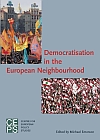Prospects for Democracy in Belarus
Prospects for Democracy in Belarus
Author(s): Uladzimer Rouda
Subject(s): Civil Society, Governance, Politics and society
Published by: CEPS Centre for European Policy Studies
Summary/Abstract: Belarus is a country in which democratic revolution has not yet taken place, but this essay argues that its chances are rather high. This conclusion is related in some paradoxical way to one of the main shortcomings of Belarus at present in comparison with pre-revolutionary Georgia and Ukraine: the character of the current political regime in the country. A semi-sultanistic political system with its low level of institutionalisation, high fusion of the ‘public’ and ‘private’, and the concentration of all power in the hands of the head of state, leaves very limited opportunities for any other forms of democratic transition connected with reforms from above or bargaining by elites. As Larry Diamond has stressed, “when authoritarian rule has been highly personalistic and decadent…the real impetus for democratic change tends to originate outside of the regime in the mobilization of civil society”.
The nature of the power – personal rather than organisational – makes it difficult for opponents within the regime to oust the ruler and also makes it unlikely that such opponents would exist in any significant numbers or the strength necessary for initiating reforms from above. In other words, the rapid transformation of President Alexander Lukashenka’s power into a neo-patrimonial one simultaneously portends its movement towards an inescapable collapse in the form of “replacement” in Samuel Huntington’s words or “ruptura” in Juan Linz’s definition of this phenomenon.
Book: Democratisation in the European Neighbourhood
- Page Range: 71-92
- Page Count: 22
- Publication Year: 2005
- Language: English
- Content File-PDF

